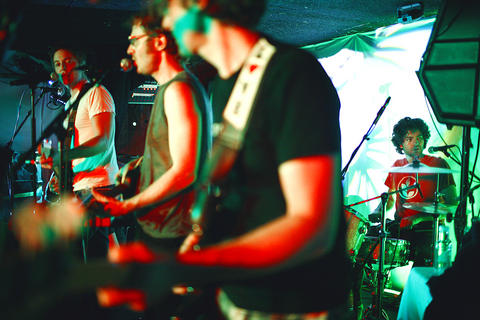Twelve centimeters of perfect, powdery snow fell here Monday, carrying a message to the frantic crowd in temporary residence at the Sundance Film Festival: Slow down. Forget the branded parties on Main Street and the accompanying marketplace of film, and just enjoy the crunch of snow underfoot as you make your way to the next screening.
Sure beats worrying.
After a huge buildup about the commercial prospects of this year's Sundance - where the writers' strike and ambient private money could fuel a frenzy of acquisitions - buyers have their hands jammed deep into their coats, responding to both the cold snap and the fear that they will spend too much on movies that deliver too little.

PHOTO: NY TIMES NEWS SERVICE
Beyond the joy of a new snowfall, there were some messages that this indie playground was welcoming more than movie stars and dollar signs. There were plenty of those, but there were also some movies with nobody special attached that rang out against the din.
On Sunday, for instance, there was a huge ovation for Trouble the Water, an intensely personal documentary about Hurricane Katrina that focused on the fight for survival traced by Kimberly Rivers Roberts and Scott Roberts, two New Orleans residents left behind by nature's brutality and government indifference. They were both present for the screening, she remarkably pregnant and remarkably happy.
And at 6:15am on Monday, Martin Luther King Jr Day, she gave birth to a girl named Skyy Kaylen Rivers Roberts, just over 3kg. Hope floats, in a hurricane, in a ruined city and, yes, at a film festival infested by wannabes and commercial interests.

PHOTO: NY TIMES NEWS SERVICE
If both buyers and sellers are a little bereft, everyone else seemed more than happy to see little movies that may not end up being seen anywhere else. Documentaries, a huge commercial fiasco coming out of Sundance last year, continued to assert themselves artistically, with Polanski and American Teen kicking up chatter in the bars and coffee shops of Park City; the conversations had nothing to do with the films' commercial prospects. And little movies like Ballast and Momma's Man renewed the festival's implicit promise of discovery but had no traction in the industry.
Main Street, of course, plays host to a few other activities besides movies. Every night there are frantic scrums in front of all manner of privatized nightlife options, with hierarchies of both need and power calculated by the minute. People in headsets examine hopefuls for credentials, wristbands, status or appearance, then decide whether they merit entrance to the warm and magical places within. Which were plenty warm in the main, though rarely magical: rooms full of absently good-looking young people who seemed more interested in an incoming text than the people around them. Those who fought their way in soon found themselves fighting equally hard to get out.
Sundance always comes with a sound track. Sunday night Patti Smith (she is here behind a documentary about her career) played, and music filled the air deep into the night. When Lil John said, "Make some noise if you're not from Park City," the visiting hordes went nuts.
And at the Egyptian Theater, Adventures of Power, a comedic film about air drumming - air guitar's dumb brother - had its premiere at midnight. The film, which features crushed-on Entourage star Adrian Grenier, was directed by and stars Ari Gold, an actor and longtime friend of Grenier's who has the dubious honor of lending his name to the Jeremy Piven character on the TV show.
In true Sundance fashion, there was a pre-party for the film, an intimate little dinner that was blown out to include hundreds, followed by the movie itself, and then an after party featuring a set by the Honey Brothers, a band that includes both Grenier and Gold. At 3:15am they were finally ready to play, but Grenier could not find - I am not making this up - his drumsticks. Some were finally obtained, and the show, as it always does at Sundance, went on.
Just about everybody who comes to Sundance brings a little something besides a love of movies, and it is all on display in the ad hoc parade that is Main Street: the impossibly tall woman with the impossibly tiny little dog with booties on; the corpulent Ronald McDonald with a huge US dollar sign in bling around his neck; the PETA protesters shouting slogans at a crowd whose members not infrequently wear fur. It can be a little bewildering.
"Do you have any idea what we are doing right now?" said Paul Giamatti as he walked down Main Street during his one day in town to promote Pretty Bird, a movie about the fight over custody of intellectual and physical property. Giamatti carried a look of wonder and confusion as he was photographed in various media locations. Now sitting at a table outside the MySpace Celebrity Lounge with a bottle of MySpace Ketchup on the table, he was pretty obviously in the midst of a branding moment, as everyone was.
Cue Paris Hilton. She is a fully integrated media company now, with clothing, fragrances, guerrilla pornography and, this being Sundance, even a movie for sale: The Hottie and the Nottie. Everybody wants Hilton - the rock band Bravery, MySpace, even Bon Appetit magazine - and she is now as much a part of the fabric of Sundance as obscure documentaries about people you had never heard of.
There has been no big bolt of theatrical lightning this year, no Little Miss Sunshine or Once. There are movies that will find both audience and distribution one way or another - Sunshine Cleaning, starring Amy Adams and Emily Blunt, seems perfectly confected - but others that rode in on a wave of hype have been just sitting there. After the premiere of What Just Happened?, directed by Barry Levinson and starring Bruce Willis and Robert De Niro, people said nice things. But the answer to the question posed by the film? Not so much.
Some of the attendees simply took Park City for what it is. Jason Reitman, the director of the runaway hit Juno, acquitted himself nicely in a charity hockey game on Sunday. Tom Bernard, the Sony Pictures Classics executive who might have been out frantically shopping, played as well.
"I would much rather be on the rink than fighting the line to get into a premiere at the library," he said. "This is safer."

Wooden houses wedged between concrete, crumbling brick facades with roofs gaping to the sky, and tiled art deco buildings down narrow alleyways: Taichung Central District’s (中區) aging architecture reveals both the allure and reality of the old downtown. From Indigenous settlement to capital under Qing Dynasty rule through to Japanese colonization, Taichung’s Central District holds a long and layered history. The bygone beauty of its streets once earned it the nickname “Little Kyoto.” Since the late eighties, however, the shifting of economic and government centers westward signaled a gradual decline in the area’s evolving fortunes. With the regeneration of the once

Even by the standards of Ukraine’s International Legion, which comprises volunteers from over 55 countries, Han has an unusual backstory. Born in Taichung, he grew up in Costa Rica — then one of Taiwan’s diplomatic allies — where a relative worked for the embassy. After attending an American international high school in San Jose, Costa Rica’s capital, Han — who prefers to use only his given name for OPSEC (operations security) reasons — moved to the US in his teens. He attended Penn State University before returning to Taiwan to work in the semiconductor industry in Kaohsiung, where he

In February of this year the Taipei Times reported on the visit of Lienchiang County Commissioner Wang Chung-ming (王忠銘) of the Chinese Nationalist Party (KMT) and a delegation to a lantern festival in Fuzhou’s Mawei District in Fujian Province. “Today, Mawei and Matsu jointly marked the lantern festival,” Wang was quoted as saying, adding that both sides “being of one people,” is a cause for joy. Wang was passing around a common claim of officials of the People’s Republic of China (PRC) and the PRC’s allies and supporters in Taiwan — KMT and the Taiwan People’s Party — and elsewhere: Taiwan and

Perched on Thailand’s border with Myanmar, Arunothai is a dusty crossroads town, a nowheresville that could be the setting of some Southeast Asian spaghetti Western. Its main street is the final, dead-end section of the two-lane highway from Chiang Mai, Thailand’s second largest city 120kms south, and the heart of the kingdom’s mountainous north. At the town boundary, a Chinese-style arch capped with dragons also bears Thai script declaring fealty to Bangkok’s royal family: “Long live the King!” Further on, Chinese lanterns line the main street, and on the hillsides, courtyard homes sit among warrens of narrow, winding alleyways and